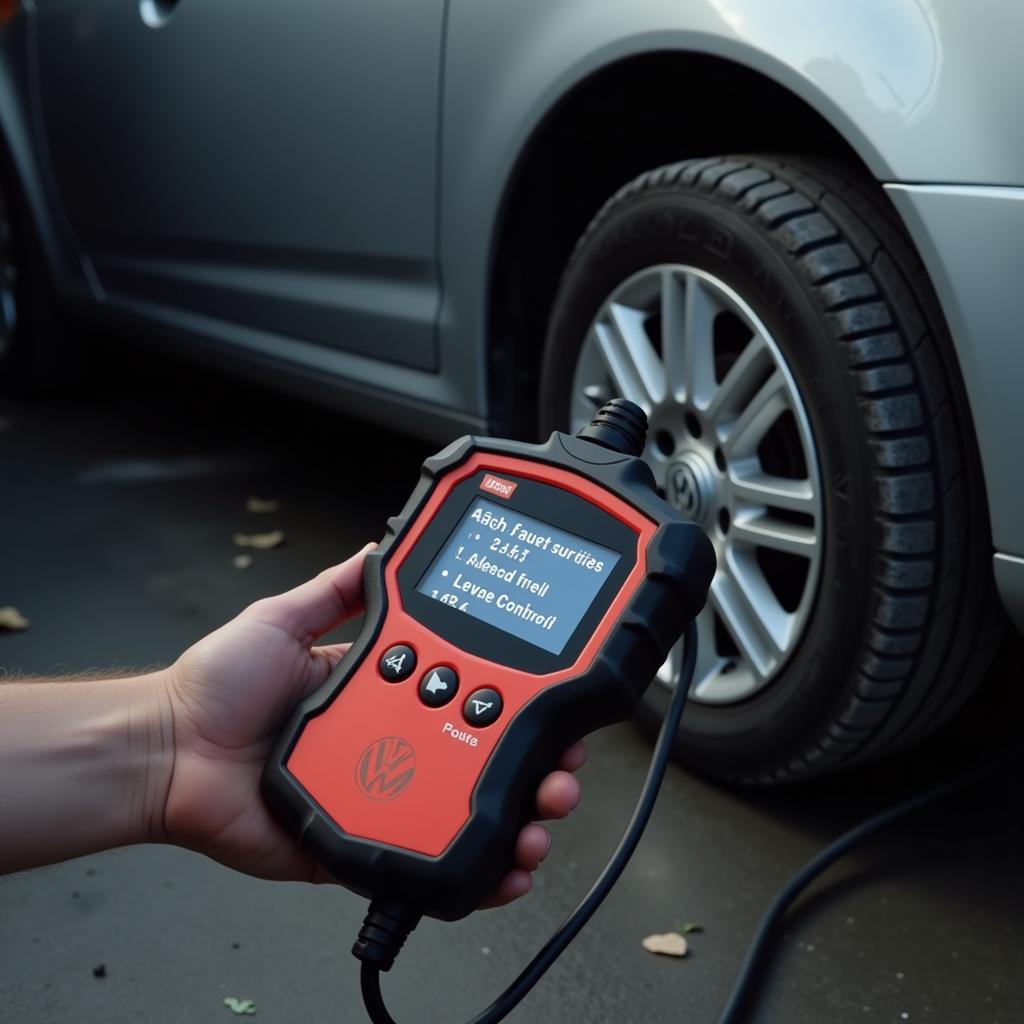Your cart is currently empty!

Decoding the VW Suspension Code: A Comprehensive Guide
VW suspension codes can be a real headache for owners and mechanics alike. These cryptic codes indicate issues within your Volkswagen’s suspension system, a critical component for a smooth and safe ride. Understanding these codes is the first step towards diagnosing and fixing the problem, getting you back on the road with confidence.
Navigating the world of VW suspension codes can feel like deciphering a secret language. But armed with the right information, you can take control of the situation. This comprehensive guide will delve into the common VW suspension codes, their potential causes, and how to address them effectively. Whether you’re a DIY enthusiast or a seasoned mechanic, this article will provide valuable insights into maintaining your VW’s suspension system. For those seeking deals on VW parts, you might find a helpful vw parts nation coupon code.
What do VW Suspension Codes Mean?
VW suspension codes are diagnostic trouble codes (DTCs) specifically related to your vehicle’s suspension system. These codes are generated by the car’s onboard computer when it detects an abnormality in one or more suspension components. They serve as a starting point for troubleshooting, helping you pinpoint the source of the issue.
Common VW Suspension Codes and Their Causes
Various factors can trigger VW suspension codes. These range from faulty sensors and wiring issues to worn-out components like shocks, struts, and control arms. Here are some common examples:
- Code related to Level Control System: This could indicate a problem with the air suspension, including leaks, compressor failure, or sensor malfunctions.
- Code related to ABS/ESP System: While not directly related to the suspension, issues with the Anti-lock Braking System (ABS) or Electronic Stability Program (ESP) can sometimes trigger suspension-related codes due to their interconnected nature.
- Code related to Steering Angle Sensor: A faulty steering angle sensor can lead to inaccurate readings, affecting the stability control systems and potentially triggering suspension codes.
 VW Suspension Code: Level Control System Fault
VW Suspension Code: Level Control System Fault
How to Diagnose and Fix VW Suspension Codes
Diagnosing VW suspension codes requires a systematic approach. Start by retrieving the codes using a diagnostic scanner. Once you have the codes, consult a reliable repair manual or online database for their specific meanings. Looking for VW deals? You can find a hot vw promo code. Don’t jump to conclusions based solely on the code. Further inspection and testing are crucial to pinpoint the root cause. This may involve visually inspecting suspension components for damage or wear, checking wiring harnesses for breaks or corrosion, and testing individual sensors.
Tools for Diagnosing VW Suspension Codes
Several tools can assist in diagnosing suspension issues:
- Diagnostic Scanner: Essential for retrieving DTCs and other relevant data.
- Multimeter: Used to test electrical circuits and components.
- Suspension Tester: Allows you to assess the condition of shocks, struts, and other suspension parts.
Why is My VW Suspension Light On?
If your VW’s suspension warning light is illuminated, it’s a clear sign that the onboard computer has detected a problem within the suspension system. This could be anything from a minor sensor glitch to a more serious mechanical failure. Ignoring this warning light can lead to further damage and compromise your safety. Understanding the underlying issue is critical. Much like understanding the intricacies of a vw heritage discount code 2019, understanding suspension codes can save you money in the long run.
What to Do When Your VW Suspension Light Comes On
- Retrieve the Codes: Use a diagnostic scanner to identify the specific DTCs.
- Consult a Professional: If you’re not comfortable diagnosing and repairing car issues, take your VW to a qualified mechanic.
Preventing VW Suspension Problems
Regular maintenance is key to preventing suspension issues. This includes routine inspections, timely replacement of worn-out components, and addressing any minor problems promptly before they escalate.
“Regular checks are far less expensive than major repairs down the line. A little preventative maintenance goes a long way in keeping your VW’s suspension in top shape,” says automotive expert, John Miller, ASE Certified Master Technician.
Conclusion
VW suspension codes provide valuable clues for diagnosing and resolving suspension system issues. Understanding these codes and taking appropriate action ensures a smooth, safe, and comfortable driving experience. Don’t let those cryptic codes intimidate you. With the right information and tools, you can keep your VW’s suspension performing optimally.
For further assistance or specialized VW repairs, feel free to connect with us. Contact VCDSTOOL at +1 (641) 206-8880 and our email address: vcdstool@gmail.com or visit our office at 6719 W 70th Ave, Arvada, CO 80003, USA.
FAQ
- What does a flashing suspension light mean? A flashing light typically indicates a more serious issue requiring immediate attention.
- Can I drive my VW with a suspension code? While possible, it’s not recommended, especially if the issue affects handling or stability.
- How much does it cost to fix a VW suspension problem? The cost varies depending on the specific issue and the required repairs.
- How often should I inspect my VW’s suspension? A visual inspection every six months or with each oil change is recommended.
- Can bad tires cause suspension problems? While not directly causing suspension problems, worn tires can exacerbate existing issues and accelerate wear on suspension components.
- What are the symptoms of a bad VW suspension? Common symptoms include a bumpy ride, excessive bouncing, unusual noises, and uneven tire wear.
- Can I reset my VW suspension light myself? While it’s possible to reset the light with a diagnostic scanner, it’s crucial to address the underlying issue first.
by
Tags:
Leave a Reply